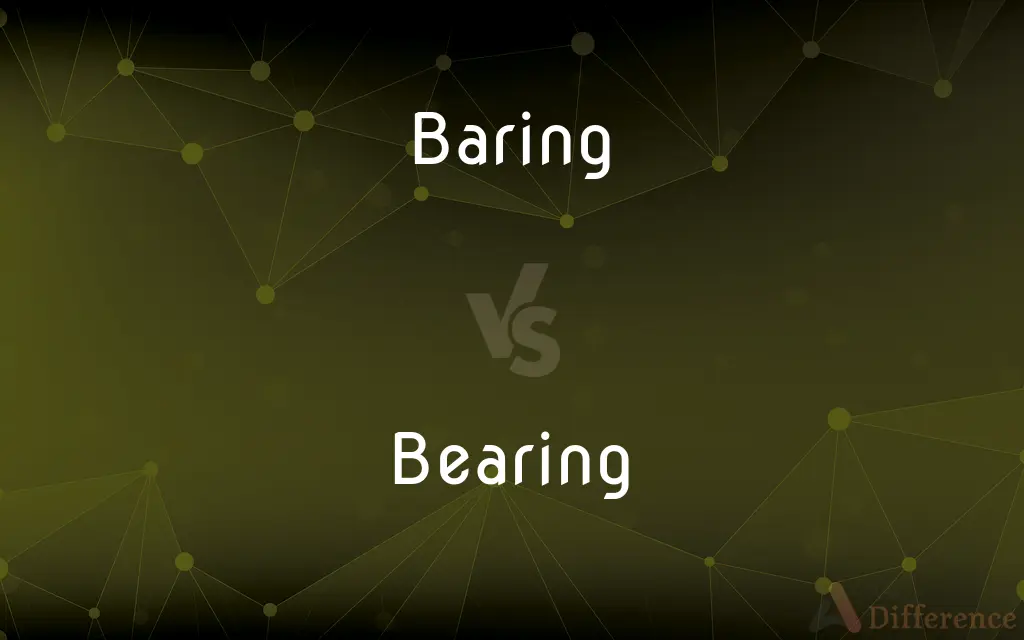Baring vs. Bearing — What's the Difference?
By Tayyaba Rehman & Fiza Rafique — Updated on April 1, 2024
Baring involves exposure or uncovering, while bearing is about carrying or enduring. Both terms convey different actions and contexts.

Difference Between Baring and Bearing
Table of Contents
ADVERTISEMENT
Key Differences
Baring primarily refers to the act of uncovering or exposing something that was previously concealed. It can be used in both literal and metaphorical contexts, such as revealing one's thoughts or feelings, or removing a cover from an object. On the other hand, bearing has multiple meanings, including carrying something, enduring an ordeal, and relating to direction or position. Bearing can denote the manner in which one carries themselves (e.g., one's demeanor or posture), the act of supporting weight, or navigating towards a specific direction.
While baring is about openness or revealing, bearing encompasses a range of actions from holding and supporting to enduring and moving in a particular direction. Baring can signify vulnerability or honesty, as it involves exposing something hidden. Whereas bearing implies strength, responsibility, or directionality, highlighting the ability to support, sustain, or guide.
In terms of usage, baring is often associated with acts of disclosure or unveiling, which can be physical or emotional. For example, baring one’s soul to someone indicates a deep level of personal disclosure. Bearing, however, is linked with responsibilities, burdens, or the way in which something is conducted. It emphasizes the capacity to manage or direct, as in bearing a heavy load or bearing north.
Baring is less about action and more about the state of being exposed or uncovered, suggesting a moment of transparency or revelation. Bearing, in contrast, suggests ongoing action or condition, such as enduring a difficult situation or carrying weight over time. This distinction highlights the temporal differences between the terms, with baring often denoting a specific moment and bearing indicating a sustained effort or direction.
Although both terms can be used metaphorically, their contexts and implications diverge significantly. Baring tends to be used in more intimate or vulnerable contexts, while bearing is broader, encompassing physical, emotional, and navigational meanings. This versatility of bearing contrasts with the more focused application of baring, underlining the diverse ways in which these terms enrich the English language.
ADVERTISEMENT
Comparison Chart
Definition
Exposing or uncovering something
Carrying, enduring, or directionality
Context
Often intimate or vulnerable
Physical, emotional, navigational
Temporal Implication
Specific moment
Ongoing action or condition
Metaphorical Usage
Yes, in revealing or openness
Yes, in responsibilities, burdens, paths
Example of Usage
Baring one’s soul
Bearing a heavy load, bearing north
Compare with Definitions
Baring
Removing coverings.
Baring the table meant removing all its cloths and decorations.
Bearing
Supporting weight.
The bridge's design is crucial for bearing the daily traffic.
Baring
Exposing oneself.
She hesitated before baring her true feelings.
Bearing
Enduring stress.
Bearing the stress of the job became increasingly difficult.
Baring
Showing previously concealed.
The artist is baring his newest works at the gallery.
Bearing
Relating to direction.
Keep your bearing straight to reach the destination.
Baring
Revealing secrets.
Baring the company's secrets could lead to legal trouble.
Bearing
Carrying oneself.
She admired his confident bearing.
Baring
Opening up emotionally.
He found baring his soul to be a deeply cathartic experience.
Bearing
Conveying manner.
His calm bearing helped ease the team's nerves.
Baring
Exposed to view; undisguised
Bare fangs.
Bearing
The manner in which one carries or conducts oneself
The poise and bearing of a champion.
Baring
Lacking the usual furnishings, equipment, or decoration
Bare walls.
Bearing
A machine or structural part that supports another part.
Baring
Having no addition, adornment, or qualification
The bare facts.
Bearing
A device that supports, guides, and reduces the friction of motion between fixed and moving machine parts.
Baring
Just sufficient; mere
The bare necessities.
Bearing
Something that supports weight.
Baring
(Obsolete) Bareheaded.
Bearing
The part of an arch or beam that rests on a support.
Baring
To make bare; uncover or reveal
Bared their heads.
Baring secrets.
Bearing
The act, power, or period of producing fruit or offspring.
Baring
To expose
The dog bared its teeth.
Bearing
The quantity produced; yield.
Baring
A past tense of bear1.
Bearing
Direction, especially angular direction measured from one position to another using geographical or celestial reference lines.
Baring
Present participle of bare
Bearing
Often bearings Awareness of one's position or situation relative to one's surroundings
Lost my bearings after taking the wrong exit.
Baring
The act by which something is laid bare.
Bearing
Relevant relationship or interconnection
Those issues have no bearing on our situation.
Baring
The removal of covering
Bearing
(Heraldry) A charge or device on a field.
Bearing
(Architecture) Designed to support structural weight
A bearing wall.
Bearing
Present participle of bear
Bearing
(in combination) That bears (some specified thing).
A gift-bearing visitor
Bearing
Of a beam, column, or other device, carrying weight or load.
That's a bearing wall.
Bearing
(mechanical engineering) A mechanical device that supports another part and/or reduces friction.
Bearing
The horizontal angle between the direction of an object and another object, or between it and that of true north; a heading or direction.
Bearing
One's understanding of one's orientation or relative position, literally or figuratively.
Do we go left here or straight on? Hold on, let me just get my bearings.
I started a new job last week, and I still haven't quite found my bearings.
Bearing
Relevance; a relationship or connection.
That has no bearing on this issue.
Bearing
One's posture, demeanor, or manner.
She walks with a confident, self-assured bearing.
Bearing
(architecture) That part of any member of a building which rests upon its supports.
A lintel or beam may have four inches of bearing upon the wall.
Bearing
(architecture) The portion of a support on which anything rests.
Bearing
The unsupported span.
The beam has twenty feet of bearing between its supports.
Bearing
(heraldry) Any single emblem or charge in an escutcheon or coat of arms.
Bearing
The manner in which one bears or conducts one's self; mien; behavior; carriage.
I know him by his bearing.
Bearing
Patient endurance; suffering without complaint.
Bearing
The situation of one object, with respect to another, such situation being supposed to have a connection with the object, or influence upon it, or to be influenced by it; hence, relation; connection.
But of this frame, the bearings and the ties,The strong connections, nice dependencies.
Bearing
Purport; meaning; intended significance; aspect.
Bearing
The act, power, or time of producing or giving birth; as, a tree in full bearing; a tree past bearing.
[His mother] in travail of his bearing.
Bearing
That part of any member of a building which rests upon its supports; as, a lintel or beam may have four inches of bearing upon the wall.
Bearing
The part of an axle or shaft in contact with its support, collar, or boxing; the journal.
Bearing
Any single emblem or charge in an escutcheon or coat of arms - commonly in the pl.
A carriage covered with armorial bearings.
Bearing
The situation of a distant object, with regard to a ship's position, as on the bow, on the lee quarter, etc.; the direction or point of the compass in which an object is seen; as, the bearing of the cape was W. N. W.
Bearing
Relevant relation or interconnection;
Those issues have no bearing on our situation
Bearing
The direction or path along which something moves or along which it lies
Bearing
Dignified manner or conduct
Bearing
Characteristic way of bearing one's body;
Stood with good posture
Bearing
Heraldry consisting of a design or image depicted on a shield
Bearing
A rotating support placed between moving parts to allow them to move easily
Bearing
(of a structural member) withstanding a weight or strain
Bearing
Producing or yielding;
An interest-bearing note
Fruit-bearing trees
Common Curiosities
How does bearing relate to direction?
Bearing refers to the direction or path one takes or gives, often in navigation.
How is bearing used in a sentence?
Bearing can describe carrying weight, enduring an ordeal, or navigating, e.g., "She is bearing the responsibility well."
Can baring and bearing be used interchangeably?
No, they have distinct meanings and contexts.
What does baring mean?
Baring refers to the act of uncovering or exposing something.
Is baring always physical?
No, it can also be metaphorical, as in revealing one's emotions.
What is the difference between baring one's teeth and bearing teeth?
"Baring one's teeth" is correct, implying aggression or readiness to attack; "bearing teeth" is a misinterpretation.
What is emotional baring?
Emotional baring involves openly sharing one's feelings or thoughts.
What does bearing a child entail?
It refers to carrying and giving birth to a child.
What does a good bearing mean?
It often refers to a confident or appropriate demeanor or posture.
Can baring be used in a technical context?
Yes, it can refer to the act of exposing a part or mechanism, e.g., in engineering.
Is baring related to honesty?
Yes, it often implies a form of honesty or vulnerability by revealing something hidden.
How does one "keep their bearing"?
It means to maintain one's composure, direction, or position under stress or in challenging situations.
Can baring be a form of artistic expression?
Yes, artists often talk about baring their souls or emotions through their work.
Can bearing indicate a social position?
Yes, it can refer to one's comportment or the way one is perceived in social contexts.
How do bearings work in machinery?
Bearings help reduce friction between moving parts in machinery.
Share Your Discovery

Previous Comparison
Haloenzyme vs. Apoenzyme
Next Comparison
Dentalgia vs. ToothacheAuthor Spotlight
Written by
Tayyaba RehmanTayyaba Rehman is a distinguished writer, currently serving as a primary contributor to askdifference.com. As a researcher in semantics and etymology, Tayyaba's passion for the complexity of languages and their distinctions has found a perfect home on the platform. Tayyaba delves into the intricacies of language, distinguishing between commonly confused words and phrases, thereby providing clarity for readers worldwide.
Co-written by
Fiza RafiqueFiza Rafique is a skilled content writer at AskDifference.com, where she meticulously refines and enhances written pieces. Drawing from her vast editorial expertise, Fiza ensures clarity, accuracy, and precision in every article. Passionate about language, she continually seeks to elevate the quality of content for readers worldwide.














































